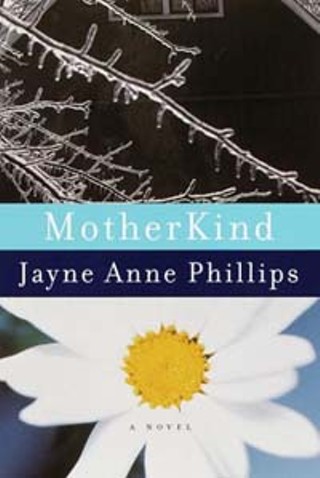MotherKind
Reviewed by Debra Monroe, Fri., May 12, 2000

MotherKind
by Jayne Anne PhillipsKnopf, 292 pp., $24
When the protagonist of Jayne Anne Phillips' novel, MotherKind, opens a package from La Leche League containing plastic nursing shields, disks with holes in the center to keep nipples erect and hygienic, she tells her mother, "They're like something out of Barbarella." Her mother doesn't know what Barbarella is, and Kate reminds her that it's a Jane Fonda movie where she wears pointy shields, gets picked up by an eagle, and "wakes in this huge bird's nest looking -- soporific." Kate wakes soporific herself a few days after the birth of her son, taking into account her new nest too: a house she's moved into with Matt, the father of her child, also her dying mother, and the noisy children Matt fathered with his not-yet-ex-wife. ("There's no such thing as a blended family ... and if there is, it's the woman who gets blended.") Kate used to live in that solitary, bohemian half-remove from squalor that's romantic if you have the means to leave it. In fact, she met Matt, a doctor, while being inoculated for a trip to India, a temporary reprieve from America, the land of "eaters, users, owners," but came back when her mother got sick.
That's Kate's backstory, recalled through labor and its aftermath, a murky haze of broken water, seeping breasts, fever. The novel begins on Christmas, ends 10 months later. In the interim, a man and woman, their child, two children from a previous relationship, an ailing grandmother, a nanny, and a few neighbors celebrate Valentine's Day, Easter, the Fourth of July. The man's divorce finalizes. The man and woman marry. One life begins. Another ends. Kate keeps vigil for both transitions: helping the baby thrive, easing her mother's dying.
The plot seems apt for a generation of readers who -- having postponed children until careers were established -- find themselves wedged between dual responsibilities of child-rearing and helping aging parents. MotherKind is predictable and jarring in the way any ritual is; for instance, a funeral. It's not suspense-driven. We know the mother will die; the baby will live. The union between Matt and Kate -- apart from heckling interruptions that are part of any divorce with children -- seems durable. Information withheld and meted out is not the point. How could it be? Death and taxes, as they say, await us. But the other side of familial love, that deep, tangled, strained, and quarrelsome bond, is grief. And grief is full of mystery, alternating gaps and pulses, memories and fear. So MotherKind is a primer for our own appointment with death, also a commemoration of survivors and their helpless contemplation of interrupted lives.
I recently read A Heartbreaking Work of Staggering Genius by Dave Eggers, which can be categorized as a literary bereavement rite too. But told from the point of view of a twentysomething still attaching overzealously to peer groups in order to facilitate his detachment from parents and meantime realizing, stunned, his parents have absented themselves permanently, his tone is rage, bafflement. MotherKind, on the other hand, is a book for middle-aged people who long ago stretched and broke the parent-child bond and reestablished it on diplomatic terms. The title of the novel refers to New-Age workers who come into Kate's home to cook organic food, fold laundry, give massages. It also refers to anyone who unstintingly takes care: a steady stream of nannies and hospice workers, Kate's mother in long-ago memories saying buck up and help yourself because no one else will, and to Kate herself, her willingness to midwife not just the arrival of life but its messy leave-taking.
Readers who know Phillips' story collection, Black Tickets, might note, as I did, that this mother seems like mothers who appeared in stories there: forthright, rigid, oppositional. Kate's mother says a chair in the living room darkened in the shape of Kate's father. Kate asks, "You mean as though his shadow sank into it?" Her mother replies, "No. Worn from use. Am I speaking English?" These mothers and their bald pronouncements seemed narrow and judgmental in Black Tickets. In MotherKind, however, the remarks haven't changed, but their reception has. "Kate ... so valued her mother's sheer dependability, her ... provincial innocence, strong opinions based on scant experience."
MotherKind feels documentary-true. I was describing it to a friend who's known Jayne Anne Phillips for years. "It's about her mother dying during the same year she had a baby," I said, meaning her, Kate, the protagonist. "So her new book's nonfiction," he said, "I didn't realize." Fiction, I said. But the distinction isn't important. We want truth. We also want form: a shape to anticipate and ponder, a struggle and deliverance, a sense at the end that the struggle was worth it. Peter Brooks once said we hope to understand life from the vantage point of its ending and that the novel, more than any other art form, mirrors this desire. With its minute depiction of gain and loss, its scraps of common sense and wisdom -- neophyte Buddhism from Kate, Jewish adages from Matt, from Kate's mother that peculiar post-Protestantism that regards self-pity as the worst sin of all -- MotherKind is a solemn evocation of our will to understand life even as we expend it.
Debra Monroe is the author of a novel, Newfangled, and two short story collections, The Source of Trouble and A Wild, Cold State. She teaches creative writing at Southwest Texas State University.








